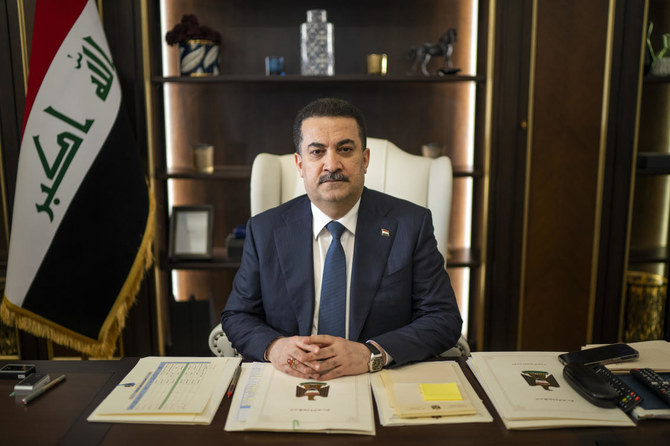BAGHDAD: Iraqi Prime Minister Mohamed Shia Al-Sudani will visit Turkiye on Tuesday for talks including on scarce water resources and the rebel Kurdistan Workers’ Party (PKK), a government source said.
Sudani is set to meet Turkiye’s President Recep Tayyip Erdogan on his first visit to Iraq’s northern neighbor since he came to power in October, an adviser to the head of the Iraqi government said, speaking anonymously.
“The two main issues are water and the presence of the PKK in northern Iraq,” he added, referring to the rebel group that has been fighting the Turkish army for decades.
War-scarred Iraq is now digging ever deeper for water as a frenzy of dam-building, mainly in Turkiye, sucks water out of the region’s two great rivers, the Tigris and Euphrates.
The Tigris and the Euphrates both have their sources in Turkiye, and Baghdad has long accused Ankara of withholding water in dams that choke the rivers, dramatically reducing flows into Iraq.
According to official Iraqi statistics from last year, the level of the Tigris entering Iraq has dropped to just 35 percent of its average over the past century.
Declining river flows have been made worse by a dire lack of rainfall in recent years, coupled with poor irrigation practices in Iraq that see excessive exploitation of water from the rivers.
Amid criticism, Turkiye’s ambassador to Iraq, Ali Riza Guney, ruffled feathers last July when he said, “water is largely wasted in Iraq” and called on people to “use the available water more efficiently.”
Sudani will also discuss with Erdogan the presence of rear bases of Kurdish fighters from the Turkish PKK rebels in northern Iraq, which Ankara has repeatedly sought to root out in air and ground operations.
The rebels have kept up a deadly insurgency for Kurdish self-rule in southeastern Turkiye since 1984.
Turkiye has dozens of military facilities in northern Iraq for use in its war against the PKK, which Ankara and its Western allies blacklist as a “terrorist” group.
In July 2022, Iraq blamed Turkiye for artillery strikes on a park in Iraqi Kurdistan that killed nine civilians, including women and children.
Turkiye denied its troops were responsible and accused the PKK.
Iraq PM to hold Turkiye talks on water, Kurdish rebels
Iraq PM to hold Turkiye talks on water, Kurdish rebels

- Shia Al-Sudani to meet Turkiye’s president Recep Tayyip Erdogan on his first visit to Iraq’s northern neighbor since he came to power in October
Syrian government foils Daesh plot to attack churches and New Year celebrations

- Bomber kills soldier in Aleppo, detonates explosives injuring 2 others
ALEPPO, DAMASCUS: The Syrian Interior Ministry announced on Thursday that it had thwarted a Daesh plot to carry out suicide attacks targeting New Year celebrations and churches, particularly in Aleppo.
The ministry said in a statement that, as part of ongoing counterterrorism efforts and careful monitoring of Daesh cells in cooperation with partner agencies, it had received intelligence indicating plans for suicide attacks targeting New Year celebrations in several provinces, particularly Aleppo, with a focus on churches and civilian gathering areas.
The ministry added that it took preemptive measures, including reinforcing security around churches, deploying mobile and fixed patrols, and setting up checkpoints across the city.
During operations at a checkpoint in Aleppo’s Bab Al-Faraj district, security forces intercepted a suspected Daesh member who opened fire. One internal security soldier was killed, and the attacker detonated explosives, injuring two others.
Daesh recently increased its attacks in Syria, and was blamed for an attack last month in Palmyra that killed three Americans.
On Dec. 13, two US soldiers and an American civilian were killed in an attack Washington blamed on a lone Daesh gunman in Palmyra.
In retaliation, American forces struck scores of Daesh targets in Syria.
Syrian authorities have also carried out several operations against Daesh since then, saying on Dec. 25 they had killed a senior leader of the group.










